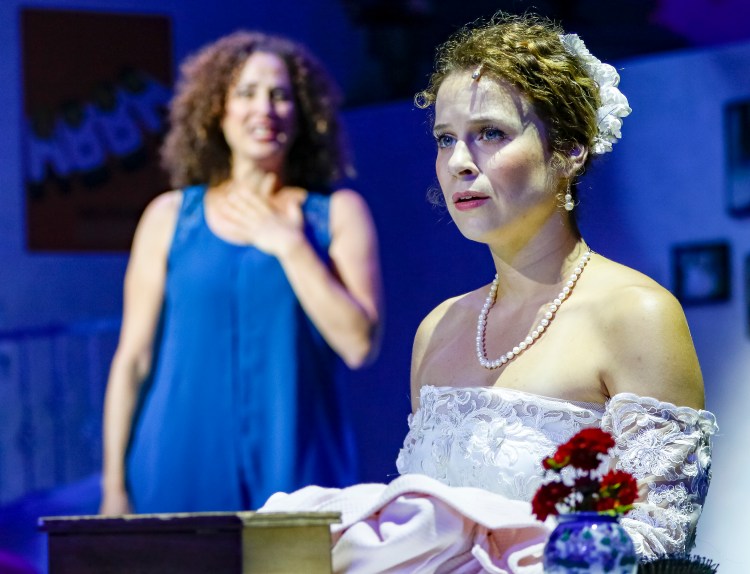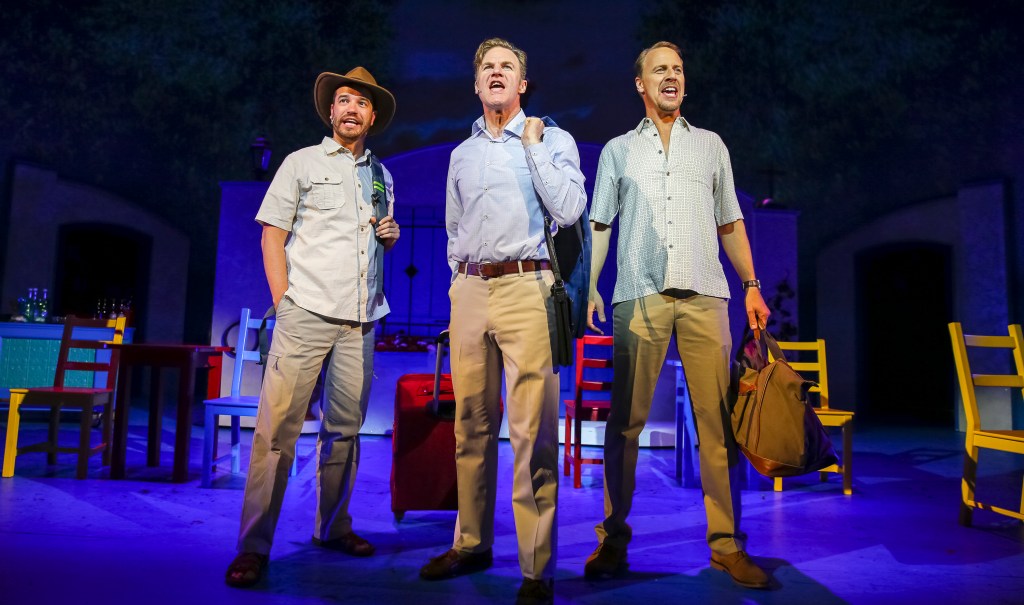The musical comedy “Mamma Mia” is a great opportunity for survivors of the disco age to actually pay attention to the lyrics of ABBA songs.
While many of us peaked in lyrical awareness with the chorus of “Dancing Queen,” original “Mamma Mia” producer Judy Craymer saw the potential for a story in the lyrics of a sheaf of other songs, resulting in the musical written by Catherine Johnson and first produced in 1999.
Maine State Music Theatre’s current production comes complete with a disco ball, goofy costumes and a troupe of ABBA-worthy musicians and singers under the musical direction of Samuel Thorne Bagala.
The cast is anchored by veterans of Broadway and touring “Mamma Mia” productions, including Lauren Mufson as Donna Sheridan, Chelsea Williams as her daughter Sophie, Ian Knauer as Sam Carmichael and Jennifer Swiderski as Tanya.
A major attraction of “jukebox musicals” is simply hearing old favorite songs performed professionally, but the story also has to work. This is accomplished in biographical musicals such as “Always, Patsy Cline” and “Buddy – The Buddy Holly Story,” both of which follow the lives of the artists, inserting their songs as performances.
In contrast, “Mamma Mia” takes on the more challenging task of weaving the story around the songs, and it’s entertaining to imagine the evolution in the writer’s mind from lines of assorted songs to a fully developed plot.
The show revolves around Donna and Sophie, who are preparing for Sophie’s wedding on the Greek island where Donna has raised her daughter on her own while running an inn. Unbeknownst to Donna, Sophie discovers that her mother had dated three men during the time period of her conception 21 years earlier, and she secretly invites all three to the wedding in hopes of meeting her father.
Hilarity ensues, but also touching moments as Donna’s friends Tanya and Rosie (the adorably funny Mylinda Hull) pull her out of 24/7 stress with song and dance (“Dancing Queen”), Donna and Sophie face parent-child separation (“Slipping Through My Fingers”) and Donna and Sam reunite (“I Do, I Do, I Do”).
Mufson, Swiderski and Hull are captivating in their first-act trios, “Chiquitita” and “Dancing Queen.” Their voices blend beautifully in close harmony, and their vocal expression and well-timed gestures give authenticity to the lyrics. “Dancing Queen” in particular comes across as improvisation building to jubilant song and dance.
Mufson is a wonderful Donna, a mother entering middle age whose years of hard work and single parenthood have submerged some of her self-awareness as an attractive and spirited individual. It feels triumphant to watch Donna reawaken in Mufson’s portrayal.
Her singing is gorgeous, with impressive musical and dramatic range. She and Williams portray a believable relationship and bittersweet transition in “Slipping Through My Fingers.” In a masterful “The Winner Takes It All,” she manages to combine a conversational tone with belting vocals.
Mufson and Knauer give a rousing “S.O.S.” as their characters start to open up to one another. Knauer emerges as a clever dancer, catching rhythmic details meaningfully, as well as a beautiful singer who partners well with Mufson. His “Knowing Me, Knowing You” is vocally resonant and full of feeling.
Director and choreographer Mark Martino keeps the show well paced with smooth scene changes and fun choreography. The ensemble provides a “Greek chorus” of song and dance, often singing offstage as backup vocalists and periodically filling the stage with choral dancing infused with Greek dance.
The young women of the ensemble, led by Emily Kelly and Taylor Broadard as Sophie’s friends Ali and Lisa, come across genuinely as girls having fun, with plenty of bopping and giggling. The ensemble men have their finest moment when they dance in swimming flippers.
Outrageous costumes evoke laughter in the dream sequence that opens the second act (Sophie’s “Under Attack”) and in the show’s traditional encores.
In “Under Attack,” the girls wear fluorescent 1970s crocheted hats and sleeves and the three “Dads” emerge in striped top hats and argyle trousers. In the encores, the women’s and men’s trios wear glittering shoulder-padded ABBA costumes complete with a comically plunging neckline for Knauer.
The encores give the band and singers the chance to go full-on ABBA in performance as well as costuming. Songs include reprises of “Mamma Mia” and “Dancing Queen” along with a spectacular “Waterloo” that ends with a blast of shiny ribbons shot into the audience.
Unsurprisingly, Friday evening’s audience sang along enthusiastically to “Dancing Queen,” fluffing some of the verses but giving full throat to the chorus.
Jennifer Brewer of Saco is a freelance writer, teacher, musician and dancer.
Send questions/comments to the editors.




Comments are no longer available on this story